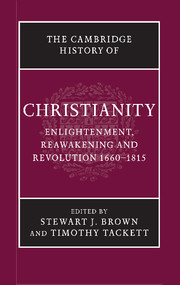Book contents
- Frontmatter
- Introduction
- PART I CHURCH, STATE, AND SOCIETY IN THE EUROPEAN WORLD, 1660–1780
- 1 Continental Catholic Europe
- 2 Continental Protestant Europe
- 3 Great Britain and Ireland
- 4 The church in economy and society
- PART II CHRISTIAN LIFE IN THE EUROPEAN WORLD, 1660–1780
- PART III MOVEMENTS AND CHALLENGES
- PART IV CHRISTIAN DEVELOPMENTS IN THE NON-EUROPEAN WORLD
- PART V REVOLUTION AND THE CHRISTIAN WORLD
- Chronology
- Bibliography
- Index
- References
1 - Continental Catholic Europe
from PART I - CHURCH, STATE, AND SOCIETY IN THE EUROPEAN WORLD, 1660–1780
Published online by Cambridge University Press: 28 March 2008
- Frontmatter
- Introduction
- PART I CHURCH, STATE, AND SOCIETY IN THE EUROPEAN WORLD, 1660–1780
- 1 Continental Catholic Europe
- 2 Continental Protestant Europe
- 3 Great Britain and Ireland
- 4 The church in economy and society
- PART II CHRISTIAN LIFE IN THE EUROPEAN WORLD, 1660–1780
- PART III MOVEMENTS AND CHALLENGES
- PART IV CHRISTIAN DEVELOPMENTS IN THE NON-EUROPEAN WORLD
- PART V REVOLUTION AND THE CHRISTIAN WORLD
- Chronology
- Bibliography
- Index
- References
Summary
General trends
The equilibrium sought in church–state relations during the later early modern era was a prize seldom attained. That failure was not a new development. This fundamental relationship in European public life had been contested as long as it had existed: which institution should be supreme in matters of law, appointments, and policy-making? By the mid-seventeenth century, it was obvious that the power of the state was becoming predominant. It was not that the princely houses of Europe were uninterested in promoting the values of Tridentine Catholicism, but they would do it on their terms, at their pace, and rarely unconditionally. The final destruction of Christendom at the Reformation and the persistent Ottoman threat had awarded them a leverage they were never slow to exploit at the expense of the papacy and the episcopate. The defence of the faith was no meaningless task and both sides appreciated well enough that the church militant on earth was dependent on how monarchs chose to understand that phrase. Lutherans had been open about this point since the Reformation and accepted that princely protection compromised institutional independence. Catholic clergy were reluctant to admit that their church was in its way no less reliant on the temporal powers and therefore no less vulnerable to Erastian incursions and policy decisions contrary to their own preferences.
In this period, the church could never assume that rulers would put the interests of Catholicism before the good of their states or the prestige of their dynasty. The Thirty Years’ War graphically drove home that lesson. What may have looked like a Catholic reconquista in the 1620s was little more than a struggle for European dominance between France and Spain two decades later, with successive cardinal ministers, Richelieu and Mazarin, unashamedly enlisting heretical help (first the Dutch, then the English) in order to ensure the triumph of ‘His Most Christian Majesty’ of France.
- Type
- Chapter
- Information
- The Cambridge History of Christianity , pp. 13 - 32Publisher: Cambridge University PressPrint publication year: 2006

